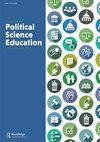The Impact of Course Structure on Students’ Political Efficacy and Confidence-in-Knowledge in Introduction to American Government
IF 0.6
Q3 POLITICAL SCIENCE
引用次数: 0
Abstract
Abstract Introduction to American Government is a foundational general education course meant to promote understanding of democracy and students’ ability to participate in it. But, there is substantial variation in how the course is structured: it can enroll anywhere from a dozen students to hundreds; it can be delivered online, face-to-face, or in hybrid format; it can feature active, interactive, or passive pedagogy. Does course structure (i.e., class size, modality, active/interactive pedagogy) affect students’ learning about democracy? We surveyed students enrolled in American government at a large university both at the beginning and end of the course. We leverage variation in structure at the university to assess its impact on growth in students’ political efficacy and confidence-in-knowledge over the semester. We find that courses that feature more active/interactive learning exhibit greater student growth in both efficacy and knowledge confidence, robust to model specification. We also find that face-to-face and online courses produce greater gains than hybrid courses, but this depends on model specification. We find no support for a direct effect of class size on student learning. The results illuminate how best to structure courses to achieve civic education goals.《美国政府概论》课程结构对学生政治效能和知识信心的影响
摘要《美国政府导论》是一门基础普通教育课程,旨在促进对民主的理解和学生参与民主的能力。但是,该课程的结构存在很大差异:它可以招收十几到几百名学生;它可以在线、面对面或混合形式交付;它可以采用主动、互动或被动的教学法。课程结构(即班级规模、形式、主动/互动教学法)是否影响学生对民主的学习?我们调查了一所大型大学在美国政府部门注册的学生,包括课程开始和结束时的情况。我们利用大学结构的变化来评估其对学生本学期政治效能和知识信心增长的影响。我们发现,以更积极/互动学习为特色的课程在功效和知识信心方面表现出更大的学生成长,对模型规范来说是稳健的。我们还发现,面对面和在线课程比混合课程产生了更大的收益,但这取决于模型规范。我们没有发现支持班级规模对学生学习的直接影响。研究结果阐明了如何最好地组织课程以实现公民教育目标。
本文章由计算机程序翻译,如有差异,请以英文原文为准。
求助全文
约1分钟内获得全文
求助全文
来源期刊

Journal of Political Science Education
POLITICAL SCIENCE-
CiteScore
1.80
自引率
36.40%
发文量
69
期刊介绍:
The Journal of Political Science Education is an intellectually rigorous, path-breaking, agenda-setting journal that publishes the highest quality scholarship on teaching and pedagogical issues in political science. The journal aims to represent the full range of questions, issues and approaches regarding political science education, including teaching-related issues, methods and techniques, learning/teaching activities and devices, educational assessment in political science, graduate education, and curriculum development. In particular, the journal''s Editors welcome studies that reflect the scholarship of teaching and learning, or works that would be informative and/or of practical use to the readers of the Journal of Political Science Education , and address topics in an empirical way, making use of the techniques that political scientists use in their own substantive research.
 求助内容:
求助内容: 应助结果提醒方式:
应助结果提醒方式:


